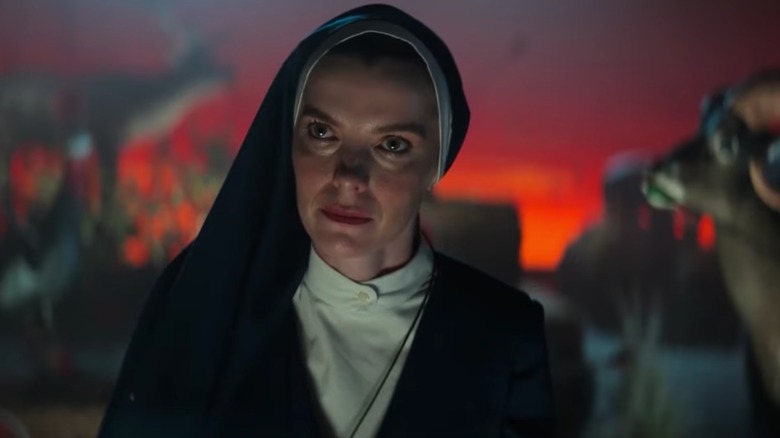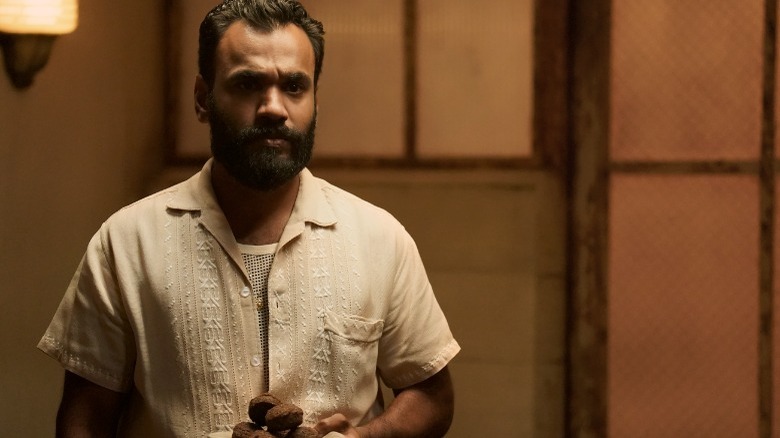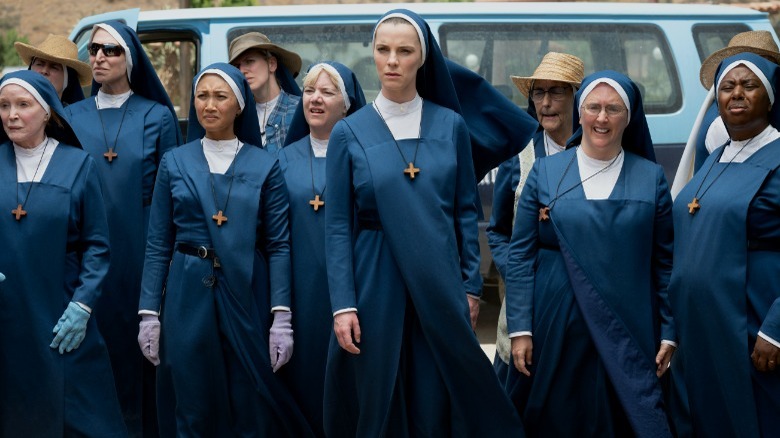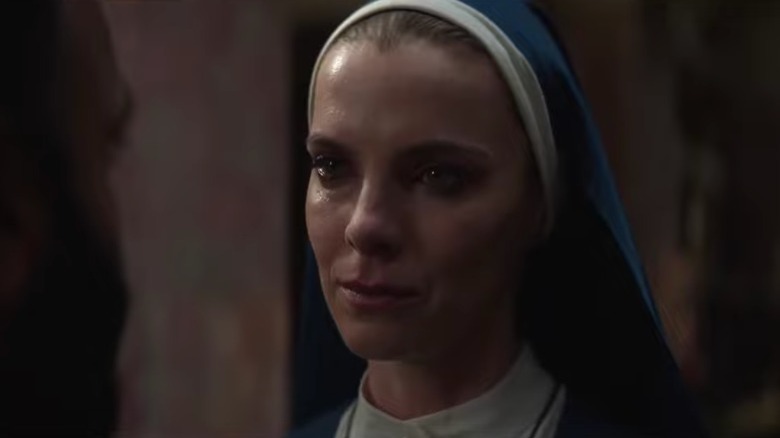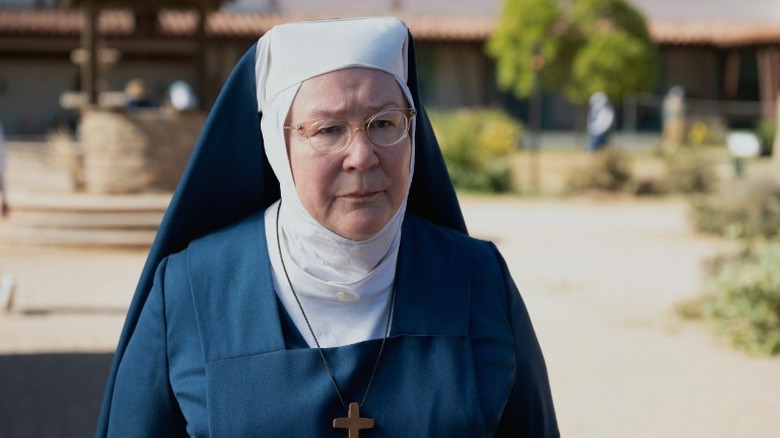Mrs. Davis Makes A Crisis Of Faith All-Too-Literal, And Its Symbolism Deserves A Breakdown
This post contains spoilers for the first four episodes of "Mrs. Davis."
"Mrs. Davis" is a trip. The new show from "Lost" co-creator Damon Lindelof and "The Big Bang Theory" writer Tara Hernandez is so strange, its own star recently described it on "The Daily Show" as "like a Rubix Cube had sex with a haunted calculator." And you know what? Betty Gilpin's not wrong there; "Mrs. Davis" is a wacky exploration of faith and technology driven by absurd, algorithmically generated details that turn out to be integral to a mission to change the world.
So much happens in the four episodes of "Mrs. Davis" that dropped on Peacock this week that it's enough to make you need a break to process. That's exactly what Simone (Gilpin) takes in the fourth episode when a series of increasingly zany clues lead her to the Vatican, where she's told to deliver an extremely expensive King cake to the Pope himself. Infuriated by the news that her husband, Jay (Andy McQueen) — who, you should know by now if you're reading this, is a personification of Jesus Christ himself — has lots of other suitors, Simone has a "screw the mission" moment and decides to sit on the Vatican steps and eat the cake instead.
Let's talk about mystical marriages
Simone's crisis of faith comes at the halfway point of the season, and while it at first seems to be represented in an odd way, the imagery of a nun consuming a King cake — and throwing up a batch of diner tickets, as Simone does right after — is actually pretty meaningful. At first glance, it brings to mind the concept of Communion, the traditional eating of bread that's believed to be the body of Christ. But Simone's communion with Jay goes a lot deeper than an occasional sip of wine and a bit of bread on Sunday morning.
The series makes Simone's marriage to Jay literal, and it's a move that has precedent. In real life, Catholic nuns and some saints do see their calling as a marriage to God, and "mystical marriage" is a concept that often feels as literal to its participants as Simone makes it look on screen. As 16th-century mystic Saint John of the Cross put it in his writing "Ascent of Mt. Carmel" (paraphrased by the online encyclopedia):
"Mystical marriage constitutes a consummate union of love; a total possession, a fusion of 'lives'—the soul is made one with God, made divine, by participation, without losing its identity."
Even Simone's sexual relationship with Jay has a historical foundation; in the Middle Ages, women mystics who were often associated with the Church wrote of religious ecstasy that was clearly sexual. They were also practitioners of a system called "affective piety," which is basically extremely vivid, imaginative, and emotion-based worship. Hildegard von Bingen, a twelfth-century German mother superior who would've probably gotten along well with Simone, wrote frankly about her religious visions but also wrote graphically about female pleasure. In short: Jay's been taking lovers for a long, long time.
A betrayal made literal
If Simone's love for Jay is based in historical precedent, her feeling of betrayal is, too. For centuries, tradition dictated that Catholic nuns were essentially among God's favorites on earth, closer to holiness than laypeople. In the 1960s, though, the Catholic Church handed down the Second Vatican Council, a revolutionary document that pushed the Church into the modern era.
Vatican II, as it's called, was helpful for many, but particularly shocking for nuns; as the 2017 film "Novitiate" points out, more than 90,000 nuns left the church after Vatican II, which many of them saw as demoting nuns from a place of honor to no better than an average believer. The religious documents were complex and interpretations vary, but the result for some nuns felt immediate: by this decree, nuns were no longer special, but just one of millions of people in communion with God.
So what does this have to do with Simone's moment of stubborn indulgence on the Vatican steps? Well, everything. Keeping in mind the Christian mystics and the Second Vatican Council, Simone's story follows that of the history of Catholic nuns as a whole, complete with the hard-to-stomach revelation that her relationship with Jay is perhaps less personal than she thought. When Simone vomits up the ripped-up slips of paper she's swallowed in the diner over the years, she's both facing and rejecting the truth about her lover; that he's definitely not monogamous, and she's not the only chosen one.
The chosen one chooses herself
Religion aside, this moment is a clever one from a storytelling perspective. The (nearly) all-seeing algorithm Mrs. Davis has shaped the story thus far, and references to the inherent stupidity of storytelling molded by algorithm serve to make Simone's journey hilariously meta. As a show, "Mrs. Davis" seems to be doing its darndest to thwart our expectations as viewers who are used to algorithm-driven streaming series; while other series can seem cookie-cutter, this one is wacky in a way that almost reads as contrarian. There's no guessing what will happen next because every twist is patently ridiculous and borderline nonsensical.
If "Mrs. Davis" exists in part to mess with our expectations as viewers on a fundamental level, the show does so in part by fiddling around with the "chosen one" narrative that drives nearly every modern adventure story. Simone choking on the receipts that prove Jay has other lovers indicates that she's not especially special, yet she chokes on the baby figurine in the King cake at the same time. King cakes are a longstanding tradition in many cultures, often tied to the Christian holiday Epiphany. Whoever gets the baby in their slice of cake is a chosen one, and is typically deemed especially lucky and blessed for the year to come.
The algorithm is predictable, but this series is not
Simone, of course, rigs the system by eating the entire cake. Of course she'll end up with the baby — because her fury drove her to keep this gift all for herself. The result is a cross-cut scene that shows the woman choking on her faith in two contexts; her chosen one status is as hard to swallow as her potential insignificance in the eyes of Jay.
"Mrs. Davis" deals with concepts of fate and chance just like the rest of Lindelof's best works do, but is less hung up on whether or not free will exists than it is on how stories like this one are often told. The show subverts our expectations at every turn, revealing the man behind the curtain early on with a nod to its own ridiculous. "Algorithms love cliches," JQ (Chris Diamantopoulos) tells Simone, "and there's no cliche bigger than the quest for the holy grail."
I think "Mrs. Davis" is being too modest here. There's nothing cliched about its off-the-wall story, nor anything obvious about its evocation of nuns' complex, centuries-long relationship with their God. When Simone makes it past her temporary crisis of faith, she's rewarded with a message that's as cryptic and strange as everything else that's happened to her so far. If her moment on the steps represents the past and present of nuns' role in the Catholic church, the future seems to be...a shoe commercial in which the Holy Grail appears, being rocked like a baby? Yeah, I'm not even going to unpack that one. Sometimes you just have to let the mystery be.
The first four episodes of "Mrs. Davis" are now on Peacock. New episodes stream each Thursday.
